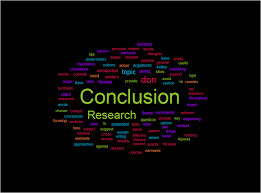5 key elements of an effective conclusion

Writing an effective conclusion can be one of the hardest things about writing an essay or dissertation. Often, by this point of the assignment you’ve run out of steam and so tend to rush it. But failing to think carefully about your conclusion can undermine all the work you’ve put in up to that point. The closing paragraphs of your essay or dissertation should serve as a way for you to succinctly restate your argument, inspire your readers, and show the wider importance and significance of your written work.
If you’re struggling to write an effective conclusion, you’re not alone. Even the most experienced writers can get stuck at this point. The real challenge is distilling everything you have written into a neat round-up, but doing this in an original way and provoking further thought about the subject. Research summarizers can help you condense what you’ve read and focus your thoughts for writing the conclusion. If you keep the following elements in mind when drafting your conclusion, they will help you not only to structure your closing remarks but also make an impact with them.
- Aim for a maximum of two paragraphs
While you don’t want to restrict your conclusion to a set word count, often the biggest challenge is getting the length right. Either they’re rushed and too short or they detail too much of what was covered in the body of the work, without saying anything new. Both of these approaches can really undermine the work you’ve done up to this point and negatively impact your grade.
The goal of your concluding paragraphs should be to restate your findings but also articulate the wider consequences of those findings in a clear, concise and compelling way. Addressing why is this study or exploration is important and what the bigger potential significance of your findings could be are both crucial elements of your ending. Conclusions should be both original and inspiring, not just a summary of your essay. Restating the argument you presented in the introduction helps to refocus the reader’s attention on the main purpose of your work, but you should avoid reiterating every word or idea: those elements belong to the main body of the assignment.
Equally, try to avoid introducing completely new ideas or arguments in the conclusion. It’s common to have new ideas right at the end of your essay or dissertation, but unless these are closely linked to the original scope of your work and offer a slightly different perspective on what you’ve already written, now is not the time to introduce them. Tagging on new ideas to the end of your work without any context can leave the reader feeling confused at best, and, at worst, frustrated
- Restate your findings
In addition to reiterating the argument or hypothesis you laid out in your introductions, summarising the results or findings of your study or examination of the topic in a few short sentences can be useful for the reader, but as always, keep this brief. Is there anything significant to say about the findings that could impact future research on the same subject and do the findings differ from or support any of the literature you researched as part of your assignment? Remarking on this will demonstrate the depth of your research and make your conclusion stronger.
- Ask yourself these questions
Why and how your research is important? An effective conclusion will motivate your reader to think more about the topic. It should leave a lasting impression. When drafting your conclusion, try to repeatedly ask yourself the question: ‘so what?’. Why should your reader care about what you’ve written? What have they learnt from reading your words? What will they take away from it and what would you like them to consider after they’ve finished reading? Articulate the answers to these questions and include them in your closing paragraphs. It can also help to think about the bigger picture behind your essay or dissertation when you write the conclusion. What is ‘the big why’ of your work? Think of societal or other broader consequences of what you’ve explored and uncovered during your writing.
- Think about the potential to develop your work
Consider the ways you could develop this piece of work in future or what others could do to build on your findings. Are there other ways of exploring the subject that you weren’t able to do as part of this piece of work? Now’s the time to briefly mention ideas that may have occurred to you towards the end of your essay. While you don’t have time to explore these in any detail, mentioning them as the basis for future work or studies will demonstrate how well you understand the subject.
- Round it off with a powerful statement or quote
Ending your conclusion with a strong, thought-provoking statement that reflects the wider significance of your work is good practice. A quote from the literature your read as part of your research can also serve you well here.
A Well-written conclusion will make a lasting impact on your reader. If you have succinctly tied your final paragraphs back to your original argument or assertion; indicated to your reader the wider significance of your exploration and findings; and finished with a thought-provoking quote or statement that captures the essence of your argument, you’ll show not only how well you have understood the subject but also your capacity to think originally about it and crystalise your thoughts.
